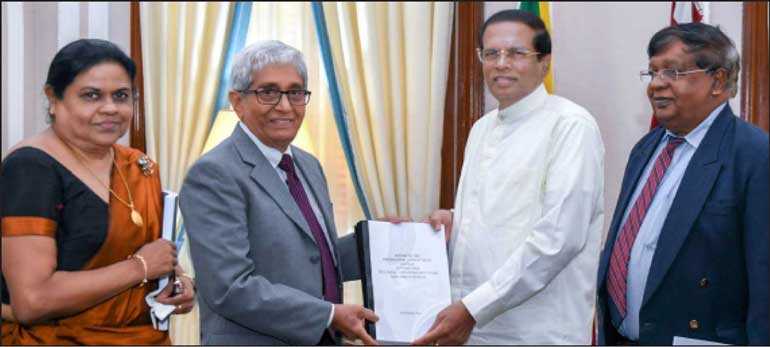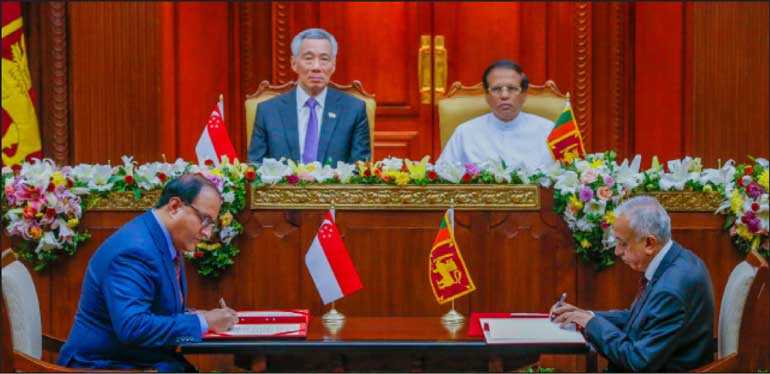Tuesday Feb 17, 2026
Tuesday Feb 17, 2026
Monday, 31 December 2018 01:39 - - {{hitsCtrl.values.hits}}


Experts Committee appointed by President says FTAs “of no use” in current economic context
Report says FTAs should be preceded by feasibility and effectiveness studies
Says domestic reforms aimed at national development goals more important
Insists NTP does not meet national trade policy requirement, recommends new approach
Slams pre-signing approval process, changes made after document presented to Cabinet
Says AG requirements were unmet, Minister failed to update Cabinet on actions
Believes more effort should have been made to engage with detractors
Wants slew of committees to study tariff removal impact, movement of people and possible waste imports
Free Trade Agreements (FTAs) are “of no use” unless backed by a slew of reforms to make Sri Lanka’s economy more competitive, a highly-critical report from the Committee of Experts (CoE) appointed by President Maithripala Sirisena to evaluate the Sri Lanka-Singapore FTA has said, while recommending that any future FTA be preceded by feasibility studies to map its need and effectiveness. The report of the Presidential Committee of Experts (CoE), spanning over 280 pages, also evaluated the New Trade Policy (NTP) and found it wanting in many aspects, going so far as to say it failed to meet its goal as a national trade policy.
“The CoE is of the view that entering into FTAs is of no use in the current context of Sri Lanka’s extremely weak competitiveness in the global economic setup. It is only through domestic economic reforms aimed at national development goals that the constraints impeding competitiveness can be eliminated and conditions conducive to sustainable and inclusive development in the country.
Hence, the CoE recommends that first order priority be given to making domestic policy reforms with main focus on the national interest, instead of pursuing the ambiguous field of FTAs,” the report said.
“FTAs are not the best way to improve Sri Lanka’s competitiveness or productivity which are constrained by structural factors such as technology backwardness, inadequate innovation, low business sophistication, drawbacks in education and training, institutional failures, poor infrastructure, political instability, macroeconomic imbalances, goods and labour market inefficiencies and financial market fragmentation. None of these problems can be resolved simply by signing FTAs, though they may have isolated positive effects on certain sectors,” the report added.
The five member CoE was appointed in August 2018 and comprised of former Vice Chancellor of the Colombo University and Emeritus Professor of Economics Deshamanya Prof. W. D. Lakshman (Chairman), Prof. Sirimevan Colombage, an Emeritus Professor of the Open University, Prof. Ajitha Tennakoon, Emeritus Professor of Economics at the Kelaniya University, and Dr. Santha Jayanetti, Independent Consultant and R.A. Jayatissa former Assistant Governor of the Central Bank.
Referring to the Government embarking on an Economic Technology Cooperation Agreements (ETCA) with India as well as negotiations with China and Thailand, the CoEwarned such parallel agreements would only complicate the situation and not readily improve the local doing business climate.
“Proliferation of FTAs with different countries involving multiple Rules of Origin gives rise to the ‘spaghetti bowl effect,’ making the foreign trade system extremely complicated and distortionary.
“The CoE is of the opinion that a comprehensive feasibility study of strengths, weaknesses, opportunities and threats (SWOT) and a strategic impact assessment is a prerequisite to any FTA to determine the long-term impacts of entering into trade agreements and create a framework to ensure the equal rights of all professionals. It is a lapse on the part of the Government that no such studies have been conducted before the negotiations with Singapore for liberalisation of trade in services commenced.”
Before the FTA was signed on 15 January this year, the Attorney General had said it could only be inked if three measures were met: (a) Concurrence was obtained from the National Procurement Commission for the Chapter on Government Procurement, (b) Necessary approvals were obtained from appropriate authorities for the relevant chapters, and (c) No opinion was expressed on the policy considerations or technical, financial and economic implications of the proposed SLSFTA.
However, the report points out that Cabinet approval was given the very next day subject to the Ministry of Development Strategies and International Trade Ministry (MoDSIT) meeting the requirements listed out by the Attorney General but no update was ever presented to Cabinet. The report also points out multiple procedural lapses and says changes were made to the FTA even after it was presented to Cabinet.
“The CoE observes that some serious lapses were allowed to occur, perhaps deliberately or inadvertently to expedite matters in the process of signing the FTA by the Minister, MoDSIT. The Minister had indeed acted without attending to the conditions laid down by the Cabinet of Ministers in its conditional approval granted to the Minister. These lapses relate to non-compliance with the ‘matters highlighted by the Attorney General’ as clearly included in the Cabinet approval as a necessary condition to be fulfilled before signing.”
The CoE also agreed that there should have been a more systematic and comprehensive process of engagement.
“Another accusation placed before the CoE was that the entire negotiation process was conducted in a hurried and a non-transparent manner without having adequate consultations with stakeholders. The CoE is of the opinion that consultations conducted by MoDSIT were rather limited. There should have been a more systematic and comprehensive consultative process to take care of conflicting views of, and alternatives suggested by, stakeholders.
“The negotiations were conducted without any overall or sectoral feasibility studies. This is clearly not appropriate, as the entire negotiation process was carried out without giving due regard to the pros and cons of the deal from the viewpoint of national interest.”
The report also raises concerns over some members of the negotiating team having conflicts of interest and highlights the fact that negotiations were begun without a trade policy. The New Trade Policy (NTP) was only presented months afterwards and was dismissed by the CoE as not meeting the standards of a national trade policy.
“The NTP is far from being a national foreign trade policy, given its structure and content. It has been presented largely in the style of an academic paper. The New Trade Policy is a stand-alone document without clearly identified linkages to any other national economic policy. The CoE recommends that a future National Foreign Trade Policy (NFTP) be based on a national development framework giving due regard not only to export led growth, but also to social equity and sustainable environment in all spheres.”
The CoE also recommends a slew of commission be appointed to deal with several controversial aspects of the FTA including movement of people and the possibility of dumping waste. It also suggests a Presidential Trade and Tariff Commission to look at the impact of phasing out some of the existing tariff structure in three years as it could have wide impact for local businesses.
“The CoE has concerns about elimination of para-tariff over a three-year period under SLSFTA, as this will be carried out in isolation without restructuring of the country’s tariff schedules. While phasing out tariffs and para-tariffs, it is important to ensure that emerging domestic industries are not unduly exposed to foreign competition. One could argue that such exposure is desirable, as Sri Lanka’s infant industries never grow. But it should be noted that their failure to reach maturity is not totally due to their deficiencies alone. It has much to do with the uncompetitive production environment caused by policy uncertainties, high energy costs, macroeconomic instability, labour market rigidities and unsatisfactory infrastructure.
“Considering these constraints, a desirable policy option would be to focus on targeted liberalisation so as to avoid interference with the growing industries, drawing from the successful experiences of Japan, South Korea and Brazil during 1965-’80 before they became complete free traders,” the report said.